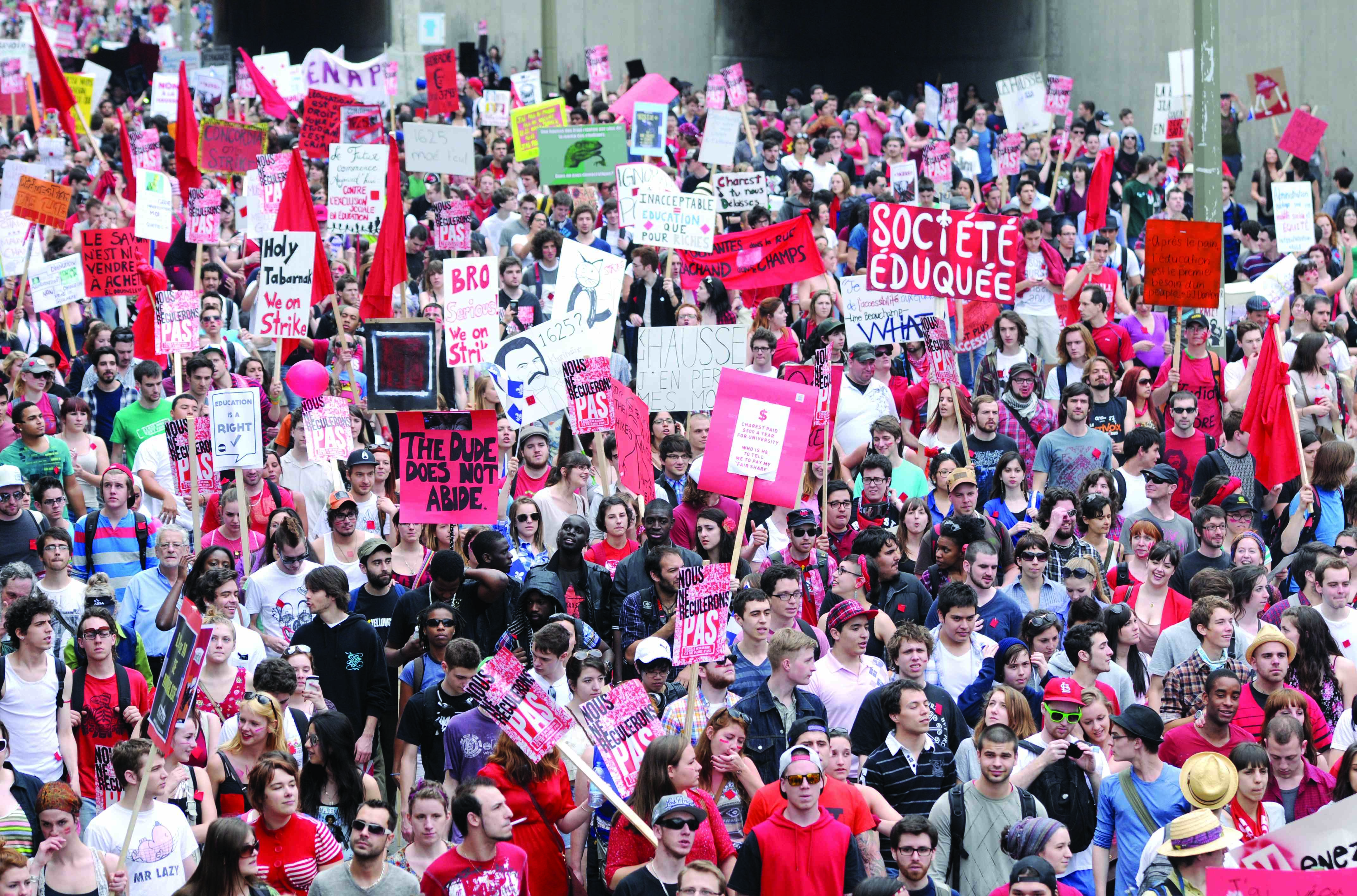
Following months of protests and students taking to the streets during the early months of 2012 to protest the proposed tuition fee increase, the winter semester ended abruptly for many in the wake of unresolved tension.
Negotiations between the provincial government and student leaders began in April following massive protests in cities province-wide. The Charest government introduced a new deal of a $254 per year increase over seven years to total $1,778 compared to the initial increase of $1,625. This offer did not sit well with student organizations and negotiations quickly dissolved.
In May, following unsuccessful attempts at negotiations between the provincial government and student leaders, then Education Minister Line Beauchamp resigned from her position.
Upon stepping down, Beauchamp said that following discussions with students leaders she lost confidence in striking a compromise.
“I am resigning because I no longer believe I am part of the solution,” announced Beauchamp on May 14.
Following the appointment of new Education Minister Michelle Courchesne, the Charest Liberals tabled a controversial and historic bill aimed at ending the student crisis. The National Assembly passed the emergency legislation May 18 with 68 in favour and 48 opposed.
Bill 78 imposes strict regulations for protests and limits the size, when and how long individuals can protest. Demonstrations must be restricted to 50 people or fewer, where the individuals must provide an itinerary eight hours in advance to police.
Hefty fines are imposed for individuals who block access to classes as the law is aimed to ensure students may attend their courses if they so wish.
The law also immediately suspended the winter semester of 11 universities and 14 CEGEPs affected by the student strikes.
The emergency legislation was immediately implemented and met with backlash from students, citizens, various groups and the Quebec Human Rights Commission that condemned the bill. It resulted in students and their supporters taking to the streets in large numbers in nightly demonstrations.
In defiance, student group Coalition large de l’Association pour une solidarité syndicale etudiante encouraged students to challenge the law by protesting in the streets. Thousands took to the streets in a sea of red during the following days resulting in mass arrests May 22 and May 23. More than 500 lawyers marched in silence to oppose Bill 78 on May 28.
During this time, demonstrators banged pots and pans every night at 8 p.m. from their balconies and in the streets of the downtown core as a way to voice their discontent with the provincial government. International protests were organized to show solidarity with striking Quebec students and the iconic red square even made an appearance on Saturday Night Live when Arcade Fire performed.
As summer continued, so did protests but in smaller numbers. Dozens still march every night but demonstrations fizzled out shortly after the tumultuous Grand Prix weekend in Montreal where police and protesters clashed.
In anticipation of a provincial election, Léo Bureau-Blouin, former president of Fédération étudiante collégiale du Québec, announced his candidacy for the Parti Québécois on July 25. Bureau-Blouin runs for the riding of Laval-des-Rapides.
The provincial government called an election for Sept. 4 on Aug. 1. Political parties were given 34 days to sell themselves to electors. More than six months of student protests is a force behind the upcoming provincial election.
On Aug. 8, Gabriel Nadeau-Dubois quietly announced his resignation as a spokesperson from CLASSE. Nadeau-Dubois’ resignation was timed with students heading back to CÉGEP and participating in strike votes. The move was surprising as Nadeau-Dubois has been the face behind the student movement since February but he felt it was time for “new blood” to arrive.
In a letter published in Le Devoir, Nadeau-Dubois wrote that the student movement had a new stage of renewal, and that it was time for him to go.
In mid-August, thousands of CEGEP students voted to return to class to finish their winter semesters. Following the return to classes of a dozen CEGEPs, students of CEGEP de Saint-Laurent and CEGEP du Vieux-Montréal also decided to discontinue their strike.
As Concordia’s new president Alan Shepard emphasized in an interview with The Concordian, the future of the student strike “depends on the outcome of the election.”
For now, the student movement and crisis has reached a lull while student groups encourage students to vote on Sept. 4. The student strike, while it continues on the 22nd of each month has reached a standstill for the time being.




